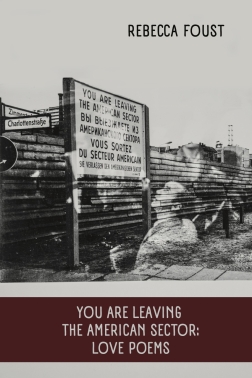You Are Leaving the American Sector
by Rebecca Foust
reviewed by Susan E. Gunter
You Are Leaving the American Sector is Rebecca Foust’s eighth book, but not her first to explore human life struggling against a fraught political landscape. In his 1942 essay “The Noble Rider and the Sound of Words”—which concerns the relationship between the imagination and reality and how World War II affected it—Wallace Stevens claimed that the poet “must be able to abstract himself and also to abstract reality, which he does by placing it in his imagination … his role is to help people to live their lives.” This is exactly with Foust’s book does: shows us that love can offer at least a temporary escape from reality’s pressures, perhaps allowing us to lead more fulfilling lives.
Reality’s pressures have differed throughout the centuries. For Stevens, it was the war; for Foust, pressures come from the contemporary American political scene, with the triumph of the 45th president, the horrors of the pandemic, and the fears that democracy will fail. She uses George Orwell’s 1984 to structure her own book, specifically focusing on the love affair between Winston and Julia and what they must endure from the state. She interweaves their story with incidents from current American life, including the January 6th insurrection, the pandemic, climate change, and attacks on women and minority groups. She imagines the deep love between these two benighted citizens as redemptive, even though it is doomed, using dream motifs and lyrical word choices to portray their feelings for one another.
The prologue expresses the first-person narrator’s desire for water and a quote from 1984: “Everything will be dead inside you … You will be hollow.” The poem reveals the lovers’ ultimate betrayal, yet still affirms human dreams and the earth’s natural beauty. Subsequent poems in the first section, called “World State of Ford 632 / USA 2016–24,” concern events from those years with a focus on America’s recent swing to the right. The second section, “Julia & Winston,” concerns the couple’s love affair, beginning with Winston wanting to pick posies from his screen to give to his lover. In the last poem of this section, Julia becomes a rose. The final section, “Leaving the American Scene,” begins with water but concerns one lover’s betrayal of the other after being tortured. These poems involve abortion and women’s rights. One poem asserts the power of poetry to say what it must: “it’s not / your bitch, anymore, to slap around.”
Foust employs a variety of formal devices to create tension between the love affair and the pressures of a totalitarian state. One imaginative poem, “Rally / Insurrection,” rewrites the events of January 6, 2021; “2016–2020” is a powerful prose poem which handily sketches the 45th president (whose name never appears), while “Julia Remembers” hymns the earth’s beauty in the form of a sonnet: “The pale-yellow raspberries sucked one-by-one / from fingers & thumbs sweeter for being secret & hard to find.” “Julia Looking Forward to the Hate” is also a prose poem, but this one has inner line breaks and starts and ends with the same erotic line, “I want to put my hands in your hair.” Flowers, birds, sky, water—these images permeate the book, contrasting with the brutality of the political moment.
The collection leaves readers with the threat of what a totalitarian regime can do, but it also asserts the power of love and poetry to bring hope. As W. B. Yeats announced at the end of “Easter, 1916”: “A terrible beauty is born.” Her timing is perfect: Foust’s book needs to be read.
Published on October 21, 2025

